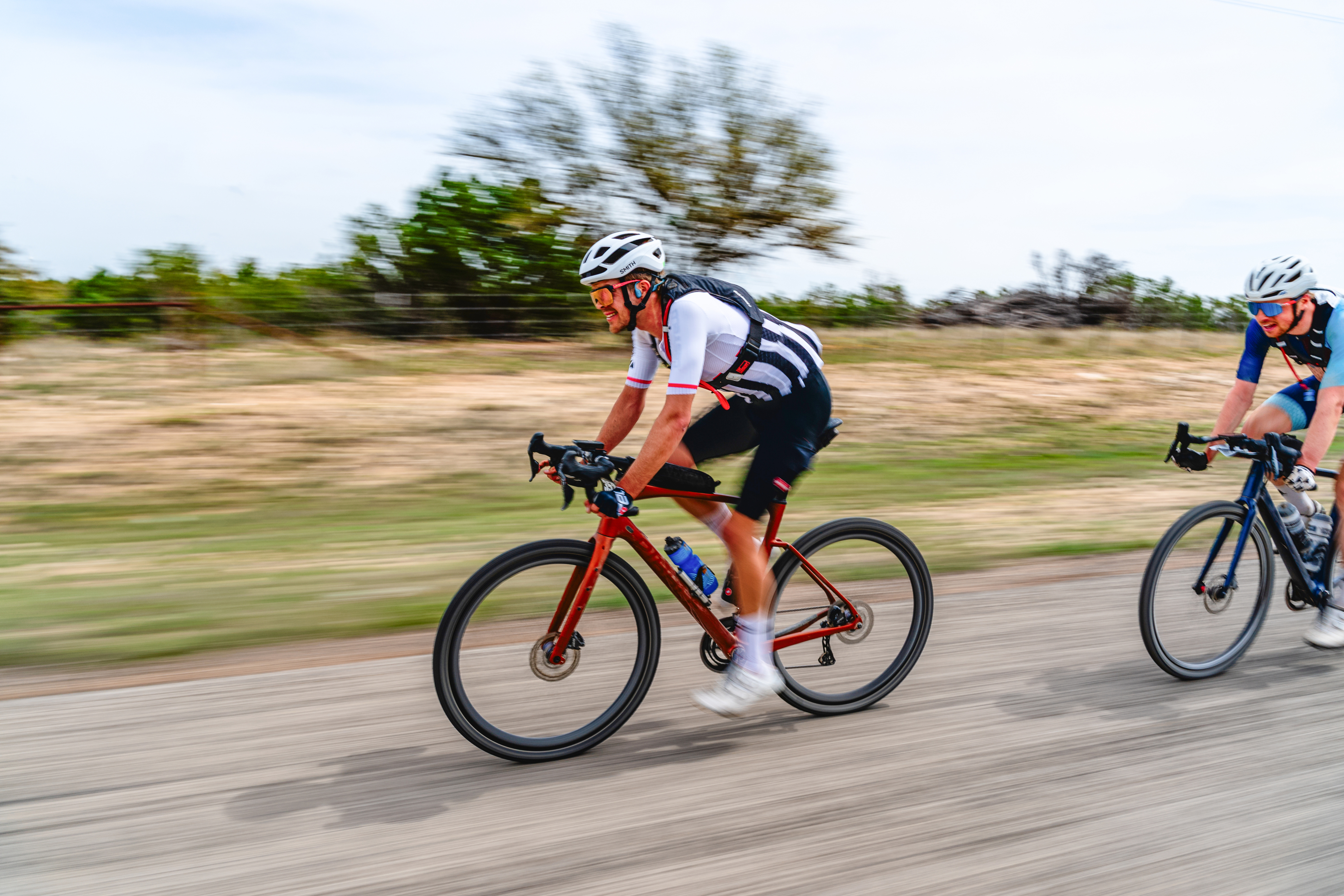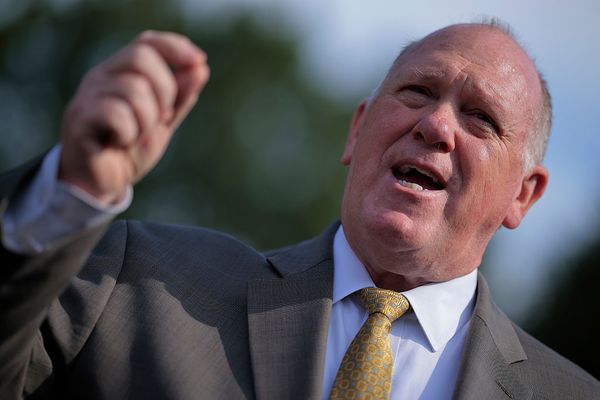
As the ‘Star-Spangled Banner’ hammers out from the loudspeakers, I can’t help but feel like a big kid on a grand adventure. Around me, all the Americans have their helmets off, their hands on their hearts. Ahead of us lies more hours of gravel racing than we even dare to guess at. As the national anthem dies down, whoops and cheers of “America” punctuate the hush. Racing on the US gravel scene hadn’t been in my career plan – I’m a fish out of water, an idiot abroad – but standing on the start line, it feels just right.
I’d stepped away from full-time road racing at the end of the 2022 season. My WorldTour dream hadn’t worked out, in the familiar way: a spell of racing for development teams, a series of injuries, and finally the acceptance that I was not quite good enough to make it. But I knew I had to keep racing. Across the Atlantic glowed the embers that could reignite my riding career – I didn’t need a team, I just needed a gravel bike and a plane ticket.
I knew that if I could win a big gravel race over in the States, I’d justify my continuing to pursue a pro career. Road isn’t everything, after all, and if you can perform on a long, dusty day in Kansas, you’re the real deal. It became my new dream: to prove I could be a pro bike racer outside of the usual mould.
I wasn’t alone in crossing the pond with a big American dream. While battling the peanut butter mud of last year’s Unbound Gravel in Kansas, I bumped into Danni Shrosbree – Britain’s first-ever national gravel champion. Like me, Danni was attempting to reinvent herself, having raced on the road with DAS-Handsling and CAMS-Basso. We formed an unspoken alliance in that Kansas mud, willing each other through the race’s many dark moments. Since then, we’ve ridden many of the same races, and have caught up in random places across the USA. Below are 10 things that Danni and I have learned from our time on the US gravel scene.
The US is where gravel stars are made

If you want to race gravel, you have to go to the States. In the same way that mainland Europe is the place to make a name for yourself in road racing, it’s the US for gravel. Heading to the US, the birthplace of gravel racing, we were chasing an American dream. The top riders are genuine celebs who make as much money as good-level WorldTour pros. Though road racing is much the same the world over, US gravel is utterly unique.
It’s long haul – in every sense
For me and Danni, racing in the US meant countless trips across the pond – neither of us could afford to live there all year. “Travel has been a joke,” Danni rolls her eyes. “The biggest thing is the cost – it’s absolutely obscene. Every airline has a different rule for bike bags, and when travelling to the US it’s an extra 100 bucks.” Then there’s the jetlag: it absolutely wipes you going back and forth to the US. “You have all the ambition in the world of racing these amazing races,” adds Danni, “but when you build in how much travel you have to do, it becomes overwhelming.”
Within three hours of landing in the US for the start of my season, I discovered that my handlebars were cracked. No matter how well you plan, something always catches you off guard. Dealing with baggage is a minefield. Every trip to the US involves a big suitcase and at least one, sometimes two, bike bags. Navigating airports alone is like a military operation.
US hospitality is next-level

I’ll never forget my first time on the US gravel scene back in 2023. Having landed at Kansas City airport for Unbound Gravel – and not yet old enough to rent a car – I posted a message on Facebook pleading for a lift. Luckily, Jim Markel, a race volunteer, replied and gave me my first taste of true American hospitality by picking me up from the airport and telling me everything I needed to know, including how excited the local area was about Unbound.
It’s an unbelievably massive country
I knew I’d spent too much time in the US this year when I exclaimed, “an eight-hour drive to the race? – that’s not bad!”. Your perspective on distance changes quickly. Multi-day road trips have become the norm, but I still can’t wrap my head around having to take connecting flights when travelling within the same country.
Once you’re on the ground at the events, you realise what the fuss is all about. I’d love to drop the average British club rider into the middle of Emporia, Kansas during Unbound week. If you could spend 10 minutes walking around, you’d understand what gravel is all about. While the pro race is important, it’s the masses – thousands of amateurs compete – who are the heart of the event. The biggest cheers are not for the winning pro but for the DFL, the rider who rolls in ‘dead f***ing last’ – everyone celebrates this moment, including the top pros.
Brits in the US really are legal aliens

The Americans love a British accent, which was good news for me and Danni. “Every time you speak, someone will say ‘Oh my God, say that again!’,” says Danni, “or they’ll start quoting Harry Potter and asking if you’re related to royalty.” Like Danni, I’ve found it strange to feel like a foreigner despite speaking the same language. Then again, there are signifi cant diff erences in the language – the way I say ‘bottle of water’ is barely comprehensible to an American. The big cities are cosmopolitan, of course, but in the rural Midwest, I begin to feel a very long way from home. And I’ll never forget the first ‘no guns past this point’ sign I saw in an airport.
It’s like living in a movie scene
Racing in the US is akin to stepping into a movie. Many things you thought could only exist on the screen, or were surely stereotypes, are revealed as true. The beauty of gravel is that you travel off the beaten track. I travelled from Emporia, Kansas, to rural Oklahoma and then rural Texas. These are not usual tourist destinations, but in each place I received an incredibly warm welcome.
I’ll never forget my time in Athens, Georgia – a hive of creativity, and the birthplace of bands REM and the B-52s. Taking a brief rest from my gravel calendar, I’d decided to race a crit – the Athens Twilight, known as the party race of the US. The road was lined with thousands of college kids who, once the race was over, started handing out beers. Three cool-down laps and three beers later, we befriended some locals.
Riding back to the Airbnb, fuelled by adrenaline and a few beers, we showered and headed straight for a local bar. We were likely the only Europeans in town, and the locals treated us like royalty. The night ended in a frat house, giving us a firsthand taste of the spring break experience.
It’s more than a race
I’ll never forget my first Unbound Gravel. The scale of that race blew me away. Whole towns were closed down, there were F1-style pit crews and thousands of bike riders. Random people were standing at the end of their driveways in rural Kansas offering water, beer and lemonade. It was a bike race, but it was also a pilgrimage. There’s so much variation across the US, and you race in some crazy places. Oregon Trail Gravel race was my favourite experience – camping under the stars amid the most incredible scenery. The race debrief happens around a campfire.
The best gravel riders are a different breed

Given gravel is so young, nobody has grown up solely a gravel racer; everyone is drawing on different backgrounds and influences. There are, however, two main contingents: the roadies and the mountain bikers – with a few obvious points of separation. That said, none of us rode gravel as our first choice, so we’re united in having started out with different dreams, before stumbling across this new discipline. This is what is unique about gravel racers: they’re not stereotypical bike racers – they have survived adversity. No surprise, then, that the field is full of larger-than-life characters. It’s even more nomadic than pro road racing, and many live in converted vans. It took my European brain a while to understand it all – I’d been so used to the circus in Europe. Gravel riding is a whole new show.
“I got to know quite a lot of the top riders well,” says Danni. “The US gravel world can seem like a bubble, but more European women are joining the party. We’re also seeing more American women come over to Europe – Sarah Sturm is a great example. She’s stepping out of her comfort zone and coming to race in the Gravel Earth Series [mostly in Spain]. Sofía Gómez Villafane and Keegan Swenson are phenomenal athletes and they’re crazy. Everyone is so determined to win – gravel is no retirement home anymore.”
It’ll reignite your passion for riding

My favourite moment in the US – an easy choice – was winning Rattlesnake Gravel in Texas. We raced through private ranchland, and after winning from a solo break, I had a rattlesnake draped around my neck as a congratulations. To be honest, though, the whole experience has been far more important than that win.
Racing gravel in the US rekindled my love for cycling. It’s weird and it’s wacky, with a culture all its own – so different from European traditions. While the sport here is getting more competitive, it still holds on to a purity that’s hard to find elsewhere. Riding in the US takes me back to the feeling of being a kid, with my bike as a ticket to freedom and discovery.
There’s no turning back
If there’s one thing my time in the US has shown me, it’s that Americans know how to put on a race. In the UK, major races often feel geared towards elite competitors, with little effort to offer something for everyone. That’s where the US truly shines – these are mass events, not just for a select few. Just as much effort is put into making sure first-time riders have a memorable experience as it is staging the pro race.
After my first US gravel race, I swore I’d never do another – it was too brutal. Yet, half an hour later, I was already planning my next trip. Eighteen months on, about 80% of my racing is on US soil. Racing across North America has given me a fresh perspective on life. The USA is vast, each state is like its own country with its own culture. I never imagined my racing career would take on such an American flavour. But here I am, and what an adventure it’s been. Over the next few years, I want to establish myself on US soil in the gravel world. The race scene is new, so what success means is constantly shifting – but my target is to one day win the big one, Unbound.
Going it alone

Joe Laverick outlines the harsh realities of being a privateer racer in the very pricey land of the free
Being a privateer isn’t glamorous. Yes, I have full freedom to travel to whichever races I choose, and I’m my own boss, with no team tactics to obey. But there are still things I miss about the old days of road racing.
The hardest part is the budget. It costs money to go racing: flights, hotels, race entries, insurance – the list goes on. As a privateer, these are all my own responsibility, whereas on a team, my only duty was performance. I’m constantly juggling – there is a lot to think about beyond pedalling my bike. I’m certainly not complaining, as I love what I do, but the more time I spend going at it alone, the more acute my sense of how babied I’d been on the road.
“Having more non-Americans come to race in the US is super exciting,” says Griffin Easter, a US gravel privateer who consistently finishes in the top 10 of the biggest races. “Many of the riders from Europe have backgrounds in road racing, which shows in their style of racing – and we’re learning from each other. The number-one rule of gravel is to have fun.”
This article was originally published in Cycling Weekly magazine. Subscribe now and never miss an issue.







